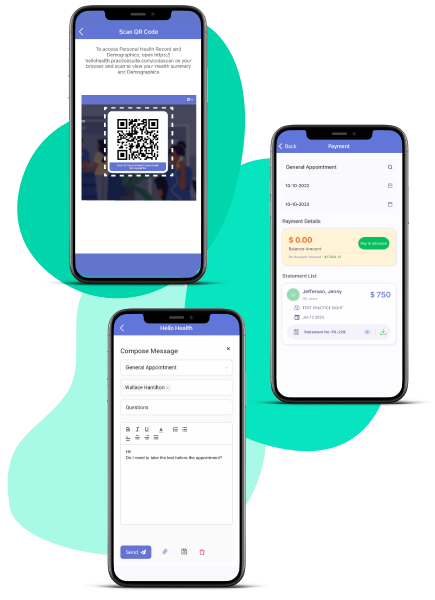The Struggles OB-GYN Specialists Face

The Struggles OB-GYN Specialists Face
Obstetricians and gynecologists (OB-GYNs) play a crucial role in reproductive health, pregnancy care, childbirth, and menopause management. However, today’s OB-GYN specialists face numerous challenges that impact care delivery and practice efficiency.
The increasing complexity of healthcare and patient demands for convenience also puts significant pressure on these specialists.
Fortunately, the “digital front door” concept is emerging as a solution that may help OB-GYNs address many of these struggles, from administrative burdens to patient engagement and retention.
Challenges Faced by OB-GYN Specialists
- Administrative Overload.
The greatest struggle OB-GYNs face today is the sheer volume of administrative work required to run a successful practice. These specialists may often manage appointments, patient documentation, billing, and compliance tasks all at the same time.
Manual administrative processes take time, divert attention from patient care, and result in inefficiencies in practice management.
Electronic health record (EHR) systems are intended to simplify record-keeping but can increase burden when not optimized for ease of use. OB-GYNs typically see a large volume of patients with sensitive information, so they need better tools to reduce time spent on data entry, appointment scheduling, and patient follow-ups.
- Patient No-Shows and Appointment Cancellations.
Missed appointments and last-minute cancellations are common complaints for OB-GYN doctors. Prenatal appointments and routine gynecological exams are essential, and missed visits can delay needed medical care.
For OB-GYNs, these no-shows are detrimental to patient health, as they result in lost revenue and wasted time slots that other patients could have filled.
The challenge is further compounded by the fact that several OB-GYN visits are scheduled months ahead of time, raising the likelihood of patients needing or forgetting to reschedule.
- Balance between In-Person and Virtual Care.
OB-GYN specialists have traditionally provided much of the care with in-person visits, including prenatal checkups and gynecological examinations. However, the increasing need for telemedicine is also altering how medical care is delivered, particularly when in-person visits aren’t possible.
Although telehealth offers great potential for convenience, it presents logistical challenges when integrating with in-person care. OB-GYNs want a flexible system to provide virtual care when appropriate and maintain ongoing communication and follow-up for in-person visits.
- Patient Communication and Engagement.
OB-GYN specialists see patients often during critical phases of their lives, such as during pregnancy or managing complex reproductive health issues. This calls for consistent, clear communication. However, traditional methods such as phone calls and mailed appointment reminders are less effective today in a digital world where patients expect real-time communication.
Patient engagement is also a challenge. Women often postpone important health screenings because of scheduling inconveniences or cost concerns. OB-GYNs struggle with keeping patients informed, engaged, and proactive in managing their health.
How the Digital Front Door Can Help OB-GYN Specialists
The digital front door provides OB-GYN specialists with tools to meet all their needs.
Adopting technology that integrates patient engagement, administrative tasks, and communications can help OB-GYN practices streamline operations, improve patient care, and boost profits.
- Simplifying Administrative Tasks.
The digital front door allows OB-GYN practices to automate routine administrative tasks.
Online appointment scheduling, for instance, frees up front desk staff and also allows patients to pick appointment times that work for them. This reduces scheduling conflicts and makes use of time slots efficiently.
Individuals can also upload personal information and medical history via patient portals just before their visit, enabling OB-GYN doctors to review this information prior to their appointment. This cuts down on time spent collecting information at appointments, allowing for more targeted care.
Many digital front-door solutions also integrate with EHRs to capture and update patient data in the EHRs.
- Automated Reminders to Reduce No-Shows.
Automated appointment reminders via text, email, or app notifications reduce no-shows and cancellations. With the digital front door, OB-GYN practices can send reminders to patients to confirm, reschedule or cancel appointments. This system reduces missed appointments and allows practices to fill open time slots more efficiently.
Patients can also reschedule appointments via the digital front door for greater flexibility and less friction. This prevents important checkups and treatments from being delayed due to scheduling conflicts or forgotten appointments.
- Telemedicine and In-Person Care in Balance.
The digital front door offers an option for OB-GYNs who prefer in-person as well as virtual care. Telemedicine is particularly helpful for follow-up appointments, consultations, and some kinds of patient training, and individuals don’t need to visit the practice for every interaction.
For example, non-emergency patients who can be medically managed can avoid unnecessary hospital visits and instead be cared for through telehealth, reducing the patient load at the tertiary center.
Telemedicine also allows OB-GYNs to expand their reach, offering services to patients in rural or underserved areas who might not otherwise have access to exceptional care.
- Enhancing Patient Communication and Engagement.
The digital front door facilitates patient engagement by providing OB-GYNs with a single point of contact for communication. Secure two-way messaging allows patients to ask questions, request prescription refills or get medical advice between appointments.
This connection may enable OB-GYN specialists to respond promptly and ensure their patients are supported throughout the care journey.
Embracing the Digital Front Door for an Efficient and Patient-Centered OB-GYN Practice
The digital front door is changing how OB-GYN specialists practice and care for patients. It can streamline administrative tasks, reduce no-shows, balance virtual and in-person care, and enhance patient communication—all of which are challenges OB-GYNs face.
As patient expectations change, adopting digital tools is no longer an option – it’s required.
Practices that embrace the digital front door will increase operational efficiency and provide better, more accessible care to their patients, and thrive in an increasingly competitive healthcare environment.

